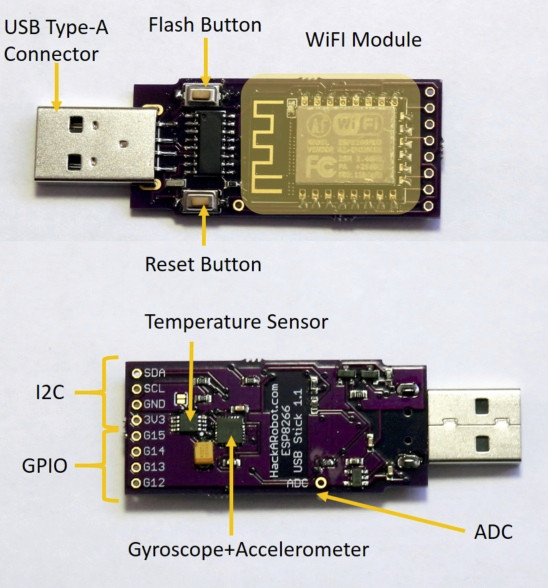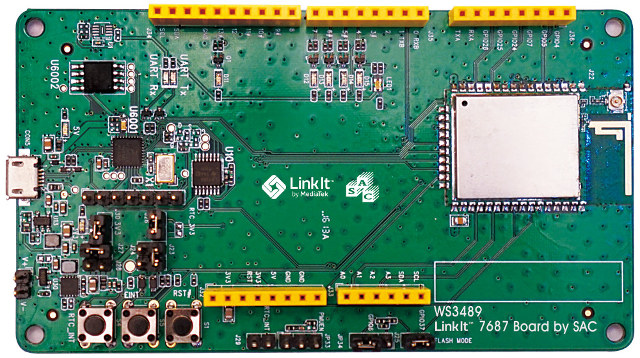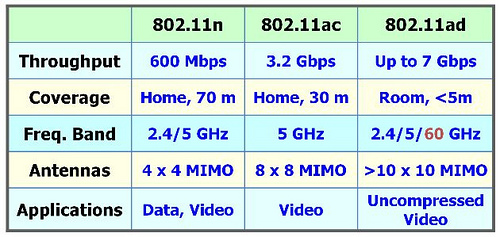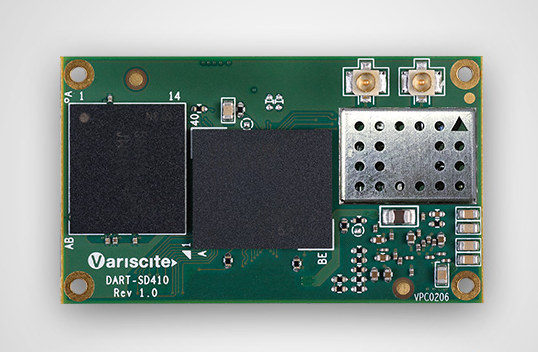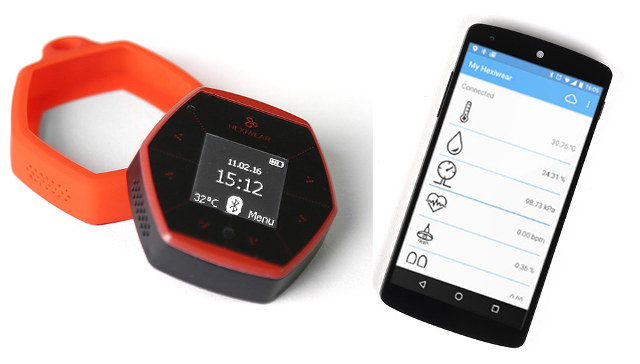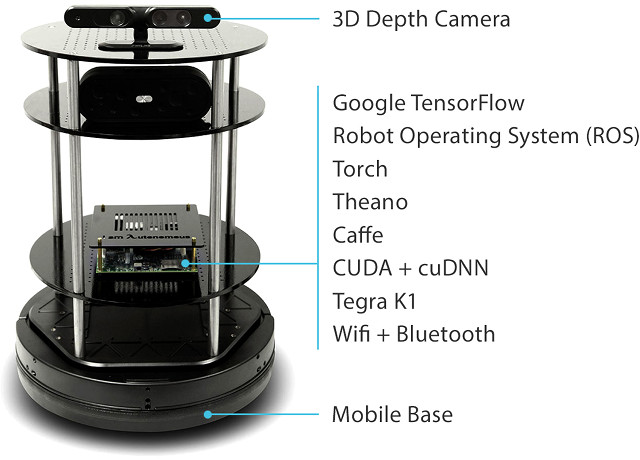There are now plenty of Espressif ESP8266 boards or module to play with, but most of them require some cables or wires, at least for power. WiThumb does not need any of that as it’s designed to be plugged into any USB ports, and includes a 6-axis motion sensor, and a temperature sensor. WiThumb USB dongle specifications: SoC – Espressif ESP8266 32-bit MCU with 802.11b/g/n WiFi Storage – 4MB Flash memory Sensors – Temperature sensor (+/- 0.25C typical accuracy, -40 to 125 C range), 6-axis gyroscope + accelerometer Expansion – Breadboard friendly through holes with 1x 10-bit ADC, I2C and 4x GPIOs USB – USB type A connector Misc – Reset and flash buttons Power – 5V via USB port Dimensions – 4.8 x 2.2 cm The USB stick can be programmed like most ESP8266 board, i.e. via USB using the Arduino IDE. In case you wonder what kind of […]
VATek VMB8202D Enmoder SoC Supports DVB, ATSC, DTMB and ISDB Modulation, H.264 & MPEG-2 Encoding up to 1080p30
Terrestrial digital TV transmitters normally cost over 1,000 dollars because there are usually implemented with expensive FPGA chips, but Taiwan based VATek has designed a low cost chips such as VMB8202D Enmoder (aka B2 Enmoder) capable of encoding 1080p60 video input to MPEG-2 (1080p30 max) or H.264 (SD resolution max), and transmitting the resulting video over DVB-C, DVB-T, ATSC, DTMB, or ISDB-T standards. VATek B2 Enmoder SoC specifications: CPU – 32-bit RISC @ 400MHz Memory – Built-in DDR Modulation Engine – VATek Multi-standard Modulator 1.0 ATSC / DTMB / DVB-T / DVB-C Media Encoder – VATek Ultral Low Latency HD Encoder supporting 1080p30 or SD MPEG-2 and SD H.264 encoding Audio Formats – MPEG-1 Layer 2, AAC Raw Video Inputs – 1x ITU-R BT.1120 or 2x ITU-R BT.656 up to 74.25MHz pixel clock Raw Audio Inputs – I2S up to 48kHz sample rate Stream Input Interface – Ethernet, Transport Serial […]
$20 MediaTek LinkIt 7687 Arduino Compatible WiFi IoT Board Runs FreeRTOS
MediaTek Labs has already launched several WiFi boards for IoT applications starting with LinkIt ONE, and later LinkIt Smart 7688 running OpenWrt, and the company is now about to launch LinkIt 7687 HDK (Hardware Development Kit) powered by Mediatek MT7687F Cortex-M4 SoC, running FreeRTOS, and developed & produced by Silicon Application Corp (SAC). LinkIt 7687 (WS3489) board specifications: SoC – MediaTek MT7687F ARM Cortex-M4F MCU @ 192MHz with 352 KB SRAM, 64KB ROM, and 2 MB serial flash in package, integrated security engine, and built-in 802.11n WiFi. 8×8 mm 68-pin QFN package Connectivity – 1×1 802.11 b/g/n WiFi with on-module PCB antenna and U.FL connector. USB – 1x micro USB for power, debugging (Coresight Debug Access Port + Virtual COM) Expansion Arduino Uno Rev. 3 headers + an extra 8-pin extension connector. Mass Storage Device (MSD) flash programming interface. Reserved headers for power consumption (current) measurement. Misc – LEDs for […]
The First Devices and Routers with WiFi 802.11ad Delivering Up 7Gbit/s Transfer Rates at 60 GHz Will Be Available This Year
802.11ad is the latest and fastest WiFi standard working in the 60 GHz band and delivering up to 7 Gbit per second data transmission rates. The 60 GHz frequency band offers both advantages and disadvantages because it does not penetrate through walls nor water, meaning it can only be used within a room limiting the range, but at the same time it’s more secure since it cannot be snooped from the outside, and for people who worry about health effects it does not penetrate the human body. 802.11ad routers will also be able to switch to 2.4 and 5.0 GHz frequency bands in order to go through walls. The table above nicely summarize the key features of 802.11ad over 802.11ac and 802.11n, however the throughput row shows the theoretical maximum throughput, but in practice, using 802.11ac as example, clients are often limited to 433 or 866 Mbps, and distance and […]
Variscite DART-SD410 Snapdragon 410 SoM Comes with WiFi 802.11 b/g/n, Bluetooth 4.1 & GPS
Qualcomm Snapdragon 410 is the 64-bit ARM processor used in DragonBoard 410c 96Boards platform, but it’s also found in several phones, some single board computers such as Inforce 6309, and we’ve also seen it in system-on-modules includes Graperain G8916 and Intrinsyc Open-Q 410. Variscite has developed their DART-SD410 system-on-module based on the processor with up to 2GB RAM, up to 16GB storage, and on-board 802.11b/g/n WiFi and Bluetooth 4.1. DART-SD410 module specifications: SoC – Qualcomm Snapdragon 410 quad core Cortex A53 processor @ 1.2GHz with Adreno 306 GPU @ 400 MHz System Memory – 1 to 2GB LPDDR3 @ 533 MHz Storage – 8 to 16 GB eMMC 4.5 flash Connectivity – WiFi 802.11 b/g/n + Bluetooth 4.1 LE (WCN3620), GPS (WGR7640), and two u.FL antenna connectors Audio – PM8916 PMIC/Audio codec I/Os available via 2x 90-pin board-to-board connectors: Display 4-lane DSI up to 720p60/1080p30, 24-bit On-carrier DSI to HDMI […]
SiLabs Wireless Gecko SoCs Support Bluetooth 4.2, Zigbee, Thread, and 2.4GHz Proprietary Protocols
Silicon Labs has introduced three new Wireless SoC families with Blue Gecko for Bluetooth Smart, Mighty Gecko for Thread & Zigbee, and Flex Gecko for proprietary 2.4 GHz protocols. All three families provides up to 19.5 dBm output power & hardware cryptography, and are pin-to-pin and software compatible. SiLabs Wireless Gecko SoC highlights: MCU Core – ARM Cortex-M4 @ 40 MHz with FPU, up to 256 KB flash, and up to 32KB SRAM. Mighty Gecko also adds a DSP Peripherals AES256/128 Hardware Crypto Accelerator ADC (12-bit, 1 Msps, 286 µA) Current DAC (4-bit, Current Source or Sink) 2x Analog Comparator Low Energy UART 2x USART (UART, SPI, IrDA, I2S) I2C (Address recognition down to EM3) Timers : RTCC, LE Timer & Pulse Counter 12-channel Peripheral Reflex System Up to 31 GPIO EFR32BG Blue Gecko Family Bluetooth Smart (Bluetooth Low Energy or “BLE”) 4.2 specification as well as proprietary wireless protocols […]
Hexiwear is an Open Source Wearable Development Kit Expandable with Add-on Boards (Crowdfunding)
MikroElektronika has designed Hexiwear, a wearable development kit that you can wear and hack as a smartwatch thanks to an (optionally) included wristband, or use a an IoT development kit thanks to its docking station taking up to three “Click” boards among a choice of over 180 modules. . Hexiwear hardware specifications: MCU – NXP Kinetis K64x ARM Cortex-M4 MCU @ 120 MHz with 1MB Flash and 256KB SRAM Storage – 8 MB Flash memory Display – 1.1” full color OLED display with capacitive touch Connectivity – Bluetooth 4.0 LE and 802.15.4 via NXP Kinetis KW4x Cortex-M0+ wireless MCU Sensors -3D accelerometer and magnetometer (NXP FXOS8700CQ), 3-Axis gyroscope (NXP FXAS21002), pressure sensor (NXP MPL3115A2R1), light-to-digital converter, humidity and temperature sensor, heart-rate sensor (HRM) USB – micro USB cable for power and charging Misc – RGB LED, haptic feedback engine, docking connector Battery – 190 mAh 2C Li-Po battery; 600 mA […]
Autonomous Deep Learning Robot Features Nvidia Jetson TK1 Board, a 3D Camera, and More
Autonomous, a US company that makes smart products such as smart desks, virtual reality kits and autonomous robots, has recently introduced a deep learning robot that comes with a 3D camera, speaker and microphone, Jetson TK1 board, and a mobile base. The robot appears to be mostly made of the shelves parts: 3D Depth camera – Asus Xtion Pro 3D Depth Camera Speaker & Microphone Nvidia Jetson TK1 PM375 board – Nvidia Terra K1 quad-core Cortex A15 processor @ 2.3 GHz with a 192-core Kepler GPU, 2GB RAM, 16 GB flash Kobuki Mobile Base – Kobuki is the best mobile base designed for education and research on state of the art robotics. Kobuki provides power supplies for external computer power as well as additional sensors and actuators. Its highly accurate odometry, amended by calibrated gyroscope, enables precise navigation. The robot is designed for research in deep learning and mobile robotics, […]


